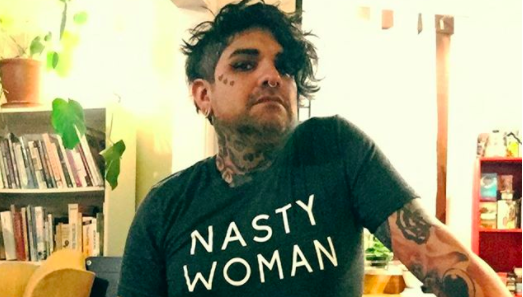Dani Goot never felt like she fit in. As a person of color with primarily Native American heritage, she didn’t always feel like she belonged in her all-white neighborhood, but didn’t feel brown enough, either. She was assigned male at birth, but she never quite felt like the other boys, and she was always related better to women.
The 43-year-old was a baby of the ‘70s, and she found her place in the punk music and anarchist scene in the late ‘80s and early ‘90s, which shared her values and gave her an outlet for political engagement. She also started working in the coffee world and began to develop a successful career in the industry.
But something still felt off. She knew there was something different about her, but she didn’t come to terms with her gender identity until she had kids. Her partner’s child from a previous relationship, and then the biological child they had together, both did not identify with the gender they were assigned at birth. Watching her children live so freely of gender constructs helped Dani address feelings she’d suppressed, and she gradually allowed herself to become what she felt to be more natural for her.
Dani eventually came out as a trans womxn*, and since starting hormones last spring, she finally started to feel like her body and mind were in alignment. While she still has some internal struggles of not feeling like enough, since beginning her transition, Dani thinks more clearly, experiences greater compassion, and enjoys living authentically. She currently lives in Oakland, California, with her family, where she’s involved in the queer coffee scene and is in an anarchist punk band, Revolution Bummer.
Two weeks ago, Dani was asked to resign from her job at Bellwether Coffee, where she served as head of coffee. She was told that she was no longer needed as part of the original members of the team and is now taking some time for herself. She is very optimistic and is currently working on plans to do work that she feels strongly about. You can bet it will have to do with coffee and community. She is hell-bent on making positive change in this world.
This is Dani’s story of finding a home in the anarchistic scene, parenting gender non-conforming kids, coming out as transgender, and starting a queer coffee movement.
Profiles in Pride: To begin, when did you first start questioning your gender identity?
Dani Goot: There’s so much self-realization, of course. But as a kid, I remember not really feeling like the other boys. I was part of their circle, but didn’t feel like I could relate too much. So most of my closest friends growing up have been more on the femme side, even the men or the boys.
At a young age, I’d say in probably the mid-to-late ‘80s, I started getting into punk rock music. I was always into music, and back then, we didn’t have the Internet to see live music. We went off album covers and just what looked interesting. I was just a little kid, and we’d go to Tower Records all the time and I started listening to music. So I’d say my real introduction to gender equality and feminism and all that stuff started with punk music in the mid-1980s when all the anti-Reagan politics were happening.
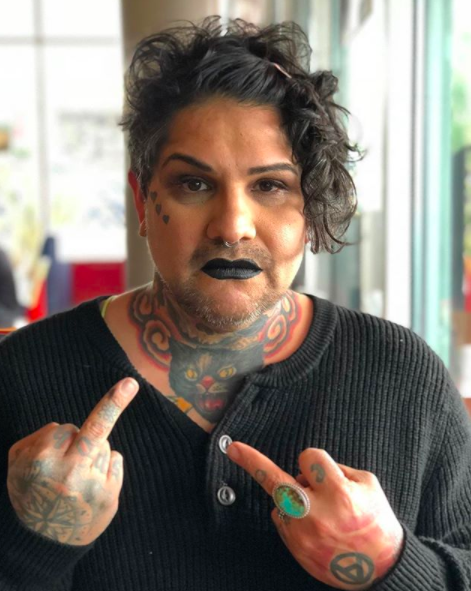
That was the stuff that really got my attention. I was like, wow, this is something I understand and can really grasp onto — you know, in a lot of the lyrics, there’s a lot of talk about marginalization, inequality, and classism. Which felt like stuff I was really interested in and learning more about. So that was kind of the beginning; I’d have to say that music was probably the thing that brought me to really feeling connected with who I was. And then as time went on, it kind of unraveled for me.
Back in the late ‘80s and early ‘90s, the queer scene in punk out here in the Bay Area was starting to really stand up and take notice and going against a lot of the fascism and a lot of the homophobia that was in our communities. That was something that really stood out at me, and again I felt really strongly about it, though I still identified as a cis male.
But the thing that was a little different for me is I am mostly Native American, so that was another thing I struggled with. Predominantly in this scene, or this subculture, there was a lot of white males specifically. It was really that, the lyrics, the politics, the stuff that really started to get me going.
At a young age, I started really feeling good about standing up against patriarchy and racism and just all these atrocities that were happening in our world. I felt compelled to be a part of that movement any way I could. So I learned a lot about anarchism, mutual aid, how we can support each other in a community and less on government crutches. Just on how other people can give us a self sense of security. So to me, that’s all tied together.
PIP: What happened as you got older?
DG: Again, I was always kind of looking at my gender and how I expressed myself. And I didn’t really know anything…I knew about transsexuals, but that didn’t feel right to me. Nothing felt right. I knew I wasn’t the usual dude. So what ended up happening was I had a partner, and she had two kids. One of them was about 16 months old when we met, the other was about 6 years old.
We realized that the youngest one was, at the age of 2, already saying, “I’m not a boy, I’m a girl.” So right away they started coming out and being who they were. With my politics and with my partner’s politics at the time, we supported that. Because who are we to say what you are?
So as time and years went on, I learned a lot from my child and what was true for them. And I think that’s something parents tend not to do so much. They try to create their child to be what they want and mold them or direct them instead of learning from them and going with their lead. My parenting skills and ideas were based around, I somehow got lost along the way and got brainwashed and caught up in society’s dreams, when my kids are actually not there yet. They’re still living their true authentic selves as much as they can, and I supported that. For five years, we supported this child to be who they wanted to be.
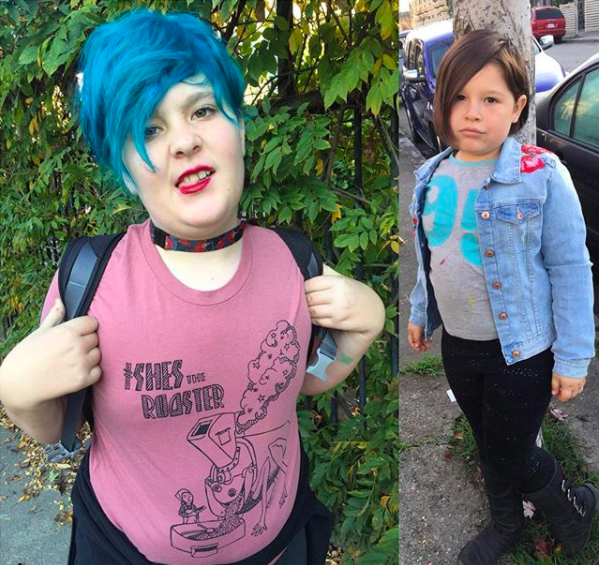
Then me and my partner decided to have a child ourselves. Our child was also born male and has identified as female as well. So we’ve had two kids who are gender non-conforming and pretty much always have been. My child has taught me more about what it means to be femme actually, because they are identifying as femme, but are not swallowing the “what it is to be a woman” pill.
At 3 or 4, they didn’t understand why there wasn’t a pronoun for both genders or no genders. I was like, “Yeah, I totally understood that,” but it was just really interesting to hear a kid say that to you.
So a lot of the stuff I learned was through my kids, really. Getting them the support they needed as parents, and finding organizations out here. Like the organization Gender Spectrum here in the Bay Area; they have been an excellent resource for my family and many others out there with trans children. They provide education to educators. There’s a reason why we moved out here — we knew this would be a better place to raise our kids. It’s more progressive out here than it was in Sacramento, where we’re originally from. We learned a lot from this organization and other people who benefit from it — kids, parents, and educators.
PIP: How did the journeys of your gender non-conforming kids impact you?
DG: This was all making sense to me, and I was already 40 years old. My youngest now is 8, so I’ve had a chance to watch development and see how things happened. And meanwhile, again, I always had these conversations, like I didn’t really relate to men, I didn’t really feel comfortable around them. It wasn’t like I necessarily felt they were bad, I just didn’t feel like I fit in enough.
That was another thing, I never felt like I was brown enough, or man enough. I was never all these things — I wasn’t smart enough, because I didn’t go to college. I don’t know what tribe I’m from; I do know that I’m about 60% Native American because I’ve had DNA testing done several times, but my family doesn’t know what tribe we’re from, because being Native American wasn’t a safe place, a safe way to be, a while back. And being brought up in more of a white, lower middle class family dynamic, growing up in an all-white neighborhood…it’s just an interesting dynamic. Again, I never had enough education, I never felt like I was enough. So that’s another thing I’m battling. I had all these struggles that made me doubt myself, like that I wasn’t enough.
I ended up really thinking about my gender fluidity. I was always drawn to femme stuff, too. I slowly started to let myself take that in. But the hardest part about this whole experience for me, in the beginning of my transition, was what people would think about me because I already had two kids who were gender non-conforming. I felt like I would be judged, or like I made them that way, like it was my agenda to do it or some project. I just had all this fear.
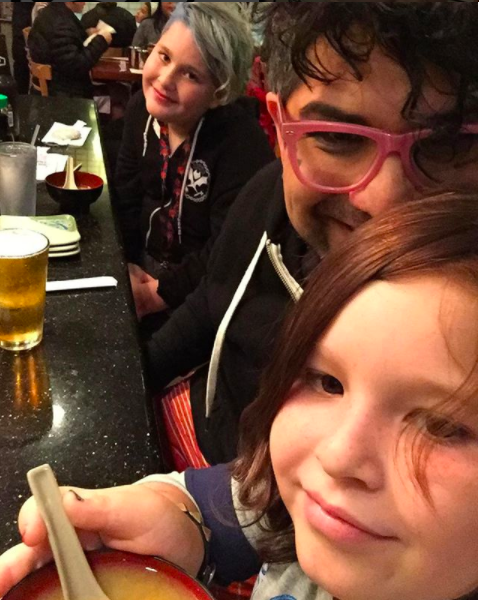
Plus, with all the advocacy work that I’d done for women and for homeless and anarchistic support, I felt like this was just another one of those things; “Oh yeah, Dani’s just taking it overboard,” that kind of thing. That was more of a struggle for me, I think, than anything else.
So I started transitioning without drugs, just dressing differently, letting myself have those feelings and go through that stuff. Then in May, I started hormone replacement therapy. Every day feels more comfortable. I’m still fighting the fight against patriarchy and misogyny and racism and all those things. But it feels a little different, it looks a little different for me now, because I feel like now I can advocate for myself, where I had never done that before. I was always doing it for other people.
Now I’m gonna push my boundaries, I’m gonna put myself out there in situations that are not comfortable, because vulnerability is the only way I can really liberate myself. The more vulnerable I can be, the more liberated I can be and less protective of who I am.
I would say that my mind and my emotions never really matched, and now they do. I feel like everything is more clear now. I’m actually able to really think better; a lot of people say you get foggy with HRT. But maybe it’s the testosterone that does that. I feel so clear — I can actually problem solve 100 times better now than I ever could. I also have so much more compassion. I’ve always had that stuff, but I feel like it’s a whole new level. I think a lot of it is because of giving it to myself. It’s hard to say what’s nature versus nurture or drugs.
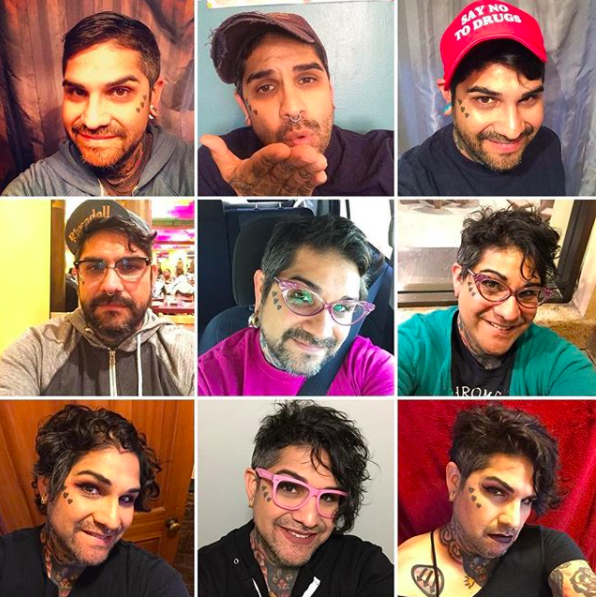
PIP: That’s great! So you’ve helped start a movement called Queer Wave Coffee. Can you explain in your words what it is?
DG: Queer Wave Coffee for me is a name; it’s a platform. I wouldn’t say that there’s anything organized about it. In our coffee community, we’ve had to deal with a few issues with gender inequality. Every community or industry has this gender inequality and homophobia, transphobia, and down the gamut. We’ve also had issues with racial issues as well in our industry.
So basically I saw Queer Wave Coffee written down somewhere and I thought, this is great. What came to my mind was this could be a space for people to congregate, join, either as an ally, an accomplice, or as a marginalized person to discuss, to have community, to help. It’s kind of like an avenue to help break down those walls and issues. Showing we’re not going to put up with it anymore.
There’s an organization called the Specialty Coffee Association. They’re like a huge umbrella, and under that there’s coffee events all over the world for coffee professionals. This year they had another event in Dubai, and a lot of people said they couldn’t go because it’s against the law to be gay or trans in Dubai. There was a big uproar in our coffee community and the SCA decided to go ahead and have it there anyway. It’s a really interesting story if you look that up. I’m heavily involved in the coffee world, part of the work that I do is community with coffee.
Everything I do, even my work, has to have some sort of positive social impact. Again, trying to be my authentic self, it’s been really hard finding those avenues of where I live, where I work — everything is political to me. The decisions I make, even my diet is very political. Even my job, living in a capitalist paradigm, I have to make sure what I’m doing is within my ethics.
So Queer Wave Coffee is basically a space for us to be seen and to be heard. To show people that we’re here and that we are a part of this community and will do our part with making positive changes.
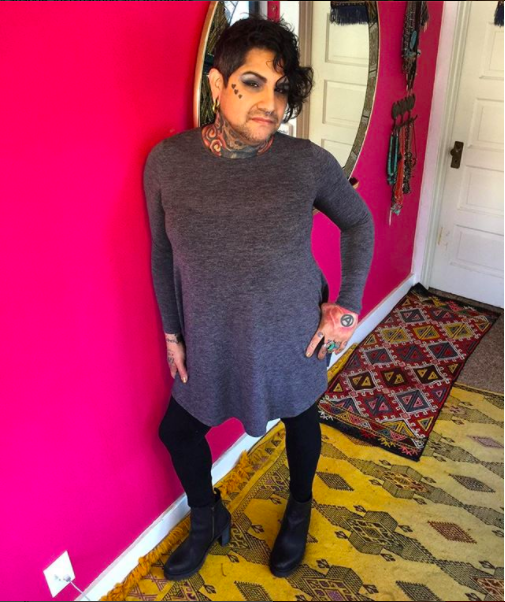
PIP: Is it only for coffee professionals?
DG: Yes, but it’s for anybody, really. People ask me what my goal is. It’s that other industries can follow the lead. To start with the space and see where this leads.
I compare it a lot — I don’t know if you know Critical Mass, it’s anarchistic. Obviously the phrase is defined in the dictionary. But it’s also a movement for bicycles for people to show awareness out on the street. You’ve probably seen people on bikes blocking the streets; it’s called Critical Mass. It’s to show awareness of them on the street, to be anti-vehicles, whatever reasons you can think of for riding the bike and clogging the streets and making people slow down, they do it.
There’s no leaders and it’s all run by the group. They take turns and they go up streets and they talk together collectively about what they want to do. That’s the same idea I want this to be as well. Here’s the name. The only thing I ask of people is not to profit off of the name. Say someone wants to have coffee events using the name. Say those coffee events cost money to go into, because there will be barista competitions where you pay money to go and compete to win first prize, and you get the money at the end of it.
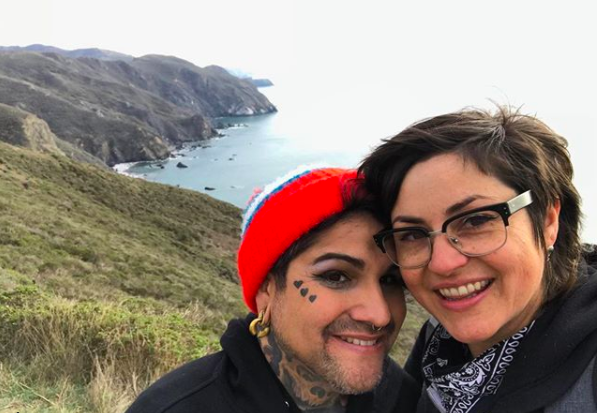
So what Queer Wave Coffee would do, and what I would love to see happen, is if they use the name for an event, to donate all the proceeds to their local queer-related or marginalized organizations. So here in the Bay Area, there’s a coffee organization called Queer In Coffee. They put on events centered around queer people. And I made some t-shirts and all the proceeds from those shirts go to them to put on more events. So basically, it’s a catalyst for raising money.
And that can be anywhere in the community. It doesn’t have to be just here. Use the name, have an event, whether you’re in Texas or you’re in Idaho, it doesn’t matter. But the money you make from it should go to your local queer organization or some sort of marginalized organization. So it’s just another one of those avenues. By doing this in coffee, just by having this as an event, this will get people out to more events and do stuff. It’s been working.
Follow Dani and her projects on Instagram at @daniglutes, @queerwavecoffee and @matchbookcoffeeproject.
*Dani prefers to use an X here “to aim to achieve female independence from patriarchal linguistic norms.”

